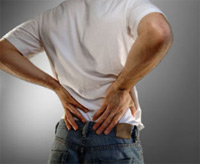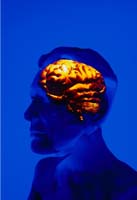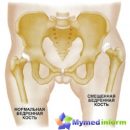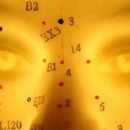What is Parkinson's disease? What are the symptoms of Parkinson's disease? What are the causes of Parkinson's disease? Answers to these questions you will find in the article.
Content
Parkinson's disease
Parkinson's disease (tender paralysis) - chronic progressive
The disease of the brain first described in 1817. English doctor
J. Parkinson. Patients with Parkinsonism often
suffer from involuntary trembling limbs (tremor), muscle
rigidity, coordination and speech violations, and also have difficulty with
movement. These symptoms are usually developing after 60 years, although known
Cases of Parkinsonism at the age of 50 years.
Parkinsonism - progressive
Disease, T.E. His symptoms and manifestations over time are exacerbated and
worsen. However, despite the fact that ultimately Parkinson's disease
leads to disability and loss of legal capacity, the disease progresses
slowly, and even after the diagnosis is made by most of the patients for a long year
can lead a full life.
Moreover, unlike other
Serious neurological diseases, Parkinson's disease can be treated.
Often resort to medication treatment, or implanted in the brain
Special device stimulating brain activity. In extreme cases
resort to surgical intervention - operation on the brain by the method of stereotaxia, the essence of which
lies in the destruction of a small zone in the subcortical structures of the brain. Currently
The search for effective treatments for the treatment of Parkinson's disease continues.
What are the symptoms of Parkinson's disease
The first symptoms of the disease
Parkinson is difficult to notice - like, for example, the immobility of the hands when walking, light
Tremor in the fingers of one hand or minor violations of speech. Sick
feel devastation, decay of forces, are susceptible to depression or suffer from
insomnia. In addition, habitual classes (shower, shave, cooking and
T.NS.) require great effort and take longer.
Tremor. Tremor often begins with easy hand shake or even
Individual fingers. Sometimes tremor hands is accompanied by uneven movement
large and middle fingers resembling the rolling of invisible pill (t.N.
«Syndrome Skania Pilyul»). Sometimes the tremor of the lower extremities occurs. These
Symptoms can be more expressed on one side of the body or manifest
Symmetrically combined with other symptoms of the damage to the nervous system:
Disorders of coordination, sensitivity, etc. Tremor is especially manifested when
The patient is in a state of stress. Although tremor limbs causes
significant inconvenience, it does not lead to loss of legal capacity and disappears
Only when the patient sleeps. Many patients with Parkinsonism suffer from only
Minor tremor.
Slow motion (Bradyknesia). Over time, the disease
Parkinson «Etern» new symptoms, including slowdiness and
awkward movements, as well as coordination violation. Muscle rigidity can
make a movement, gait. It is especially annoying since
makes it difficult to perform the simplest action.
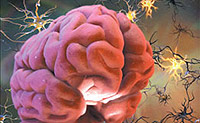 Muscle rigidity. Muscle rigidity (or rigidity) often appears
Muscle rigidity. Muscle rigidity (or rigidity) often appears
Neck and limbs. In some cases, rigidity even shines movements and
causes pain.
Loss of equilibrium. Parkinsonism, especially in severe, often
accompanied by the inability to maintain equilibrium. For many years this
The problem remains insignificant and does not cause discomfort.
Loss of automatic movement. Blinking, the appearance of a smile and
waving hands when walking - automatic actions of a normal body,
which are performed on the subconscious level and even in addition to our desire. W
Patients with Parkinsonism this automatism of movements often disappears, and sometimes
disappear at all. In some cases, on the face of patients steadily fixed
expression of close and tense attention, a non-moving look. In some
Patients, except for the facial expressions, disappears and the ability to gesture.
Violation of articulation. Many patients with Parkinsonism also suffer
From violation of speech - it can become a weakly modulated, illegible. Voice
loses intonation and becomes monotonous and quiet. For older people it
represents a special problem because there are poorly hearing elderly cohabitants (husband
or wife) can simply not hear them.
Violation of swallowing and salivation. This symptom appears on
Late stages of the development of the disease, but, with rare exceptions, patients with this
the symptom is still able to make food independently.
Dementia. Minor percentage of patients with Parkinsonism suffers
from dementia - inability to think, understand and memorize. This symptom is also
Appears in the later stages of the disease. Although weakly think more often
manifestation of Alzheimer's disease, it can accompany other serious
Diseases, including Parkinson's disease. In this case, the beginning of dementia
Specifies the slowdown in mental processes and inability
focus.
What are the causes of Parkinson's disease
For those 200 years that went with
the moment of opening Parkinson's disease, scientists managed to understand some aspects and
processes of this complex disease.
Today it is known that many
Symptoms and manifestations of Parkinson's disease are developing due to damage or
The destruction of certain nerve endings (neurons) located in black
Brain substance. In normal condition, these nerve cells
produce dopamine. Dopamine function lies in the smooth transmission of pulses
To ensure normal movements. In Parkinson's disease decreases
Dopamine products, the normal transmission of nerve impulses is disturbed and
The main symptoms of Parkinsonism appear.
In the process of aging, all people are deprived
Of some part of the non-neutrons producing. But patients with Parkinsonism lose
More than half of neutrons located in black substance. Although happens
Degeneration of other cells of the brain, it is cells that produce
Dopamine, necessary for movement, so their loss of catastrophic. Causes
Damage or destruction of these cells is still the object of many
Research. According to scientists, Parkinson's disease can develop due to
adverse combination of genetic and external factors. Defined
medicines, diseases and toxic substances can also create clinical
Picture characteristic of Parkinsonism.
Genetic factors. According to scientists, genetic
factor plays an important role in the development of Parkinsonism, but it is still difficult
determine how strong is heredity.
External factors. People working with herbicides and
pesticides, stronger at risk of Parkinson's disease, than
rest. However, scientists have not yet been able to establish a connection between any other way or another
Toxic substance and parkinsonism.
Medicine. A number of drugs taken in
For a long time or in large doses, can cause symptoms
Parkinsonism. These include drugs such as Haldol and chloropromazine (Thorazine), which
prescribed in the treatment of some mental disorders, as well as drugs
against nausea, for example, metoclopramide (REGLAN, METOCLOPRAMIDE).
Tool against epilepsy Valproat (Depakene) can also cause some symptoms of disease
Parkinson, especially Tremera.
These medicines do not cause
The development of Parkinson's disease, and symptoms disappear after the cessation of their reception.



